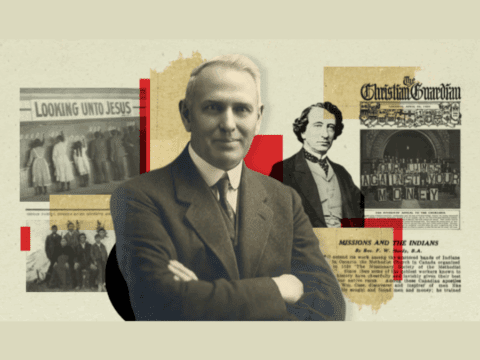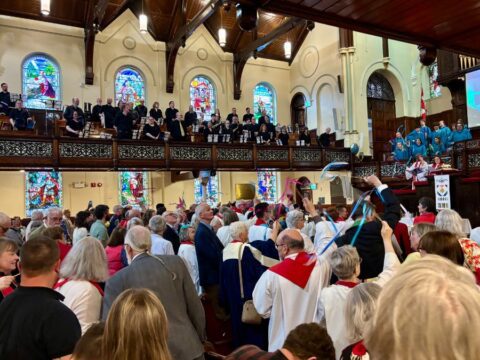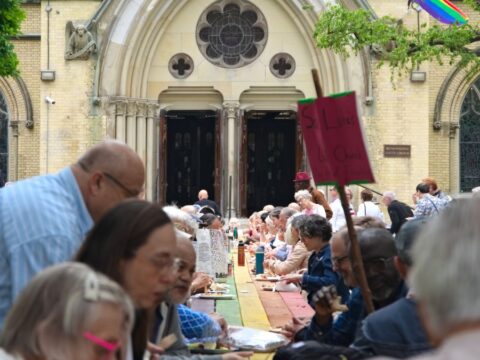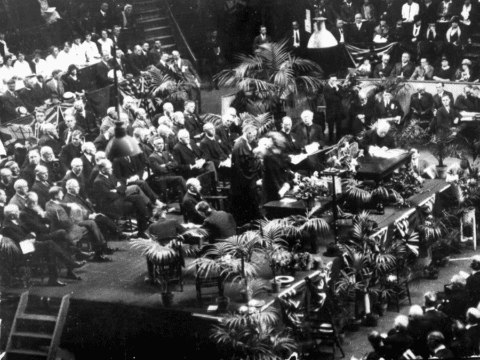When Rev. Peter Gordon White first started going to Rosedale United, he was introduced to a woman after the service.
“Didn’t you used to be someone important in the United Church, like the treasurer?” she asked. “No,” Peter replied quickly. “They wouldn’t trust me with the money!”
It wasn’t long before no one at this Toronto church cared who he used to be or what title was on his door. He was just that gentle man sitting up near the front with his wife, Patricia, at Sunday worship, occasionally taking part in services, speaking at someone’s funeral and co-chairing the pastoral care committee.
But that woman had it right. For over 40 years — two-thirds the lifetime of the United Church when he officially retired in 1986 — Peter Gordon White was one of the formative figures in the history of the denomination.
Born in Scotland in 1919, Peter immigrated to Winnipeg at age two, joining the United Church with his family when it was formed a few years later. During the Great Depression, he left school to earn $8 a week as a bicycle messenger. He later apprenticed as a printer, like his father, completing the five-year Typographical Union qualifications with the highest grade ever achieved in Manitoba, and finishing high school at night.
In those days, the church had “spotters” on the watch for bright young men, and later women. A spotter named Rev. E.G.D. Freeman noticed Peter’s spark and encouraged him to study at United College in Winnipeg. Freeman was also the dean of the university and the father of future moderator Very Rev. Lois Wilson. Wilson, who was there at the time, says Peter was a “big man on campus”: he wrote and acted in skits and plays and was voted Senior Stick by his classmates. In 1938, he became a candidate for ministry at Crescent Fort Rouge United in Winnipeg, where his picture still hangs on the wall.
Ordained in 1946, Peter started as a Christian education field secretary, barnstorming from Rainy River, Ont., to Flin Flon, Man., and back, lighting up far-flung congregations, kindling vain hopes in some young ladies (and their mothers), organizing camps and lay schools, and everywhere hearing people’s yearnings for better ways to learn about the Christian faith.
Before long, despite warnings from Prairie colleagues “not to fall into the clutches of that gang,” Peter took a job in Toronto at the United Church’s head office preparing livelier and more contemporary Sunday school materials. In my first church, an engaging booklet on Mark’s Gospel for teenagers and their teachers came across my desk and stayed there for several years as a reliable kindler for my beginning sermons. It was written by Peter Gordon White, the first time I’d ever heard that name.
When Peter arrived in Toronto, revising the old tell-it-from-the-front style of Sunday school was already being discussed, with lots of resistance from lovers of the way things had always been done.
Peter, hard to discourage, impossible to dislike, brought news that if nothing changed in the United Church, frustrated congregations would take their business elsewhere. Worse, churchgoing adults who had never been taught about myth and metaphor — staples of biblical understanding in mainline seminaries for the past 50 years — would be unequipped for the eventual world of Richard Dawkins and the God particle. In 1956, Peter was named editor-in-chief of what became the famous (or infamous) United Church New Curriculum.
With patience, canniness and Scottish charm, Peter pressed his vision through bureaucratic tangles and backward-looking opposition. Nationwide consultations and evidence from his own experience finally persuaded a reluctant church. Peter was granted an unprecedented $1 million up front to produce three years’ worth of take-home hardcover books for every level of church school.
He enlisted artists, educators, presidents, professors and ministers, commissioning them to make modern biblical scholarship and theology accessible to congregations and families. Teachers, parents and children had resources in their hands that no one had put there before. And they were ready. The first book for adults, Donald Mathers’s The Word and the Way, sold 600,000 copies — unheard of for a Canadian title. One transfixed reader was future moderator Very Rev. Stan McKay, fresh from an Indian residential school, trying to decide about the church. The book, he says, is still on a shelf by his bed.
At the same time, the public backlash against the New Curriculum was immense and immediate, particularly in other, more conservative denominations for whom it was never intended. Some ministers there found sermon topics for an entire year: “Attack the United Church.” The press loved it. Meanwhile, Peter, witty and eloquent in his defence of the curriculum, coped with death threats by mail.
In 1964, the General Council met in Newfoundland and reaffirmed Peter’s work. By the following year, the New Curriculum was used in 90 percent of United Church congregations. The three-year cycle was repeated three times, until hardcover resources had seen their day.
By then, an entire generation in the United Church was equipped with an understanding of faith that did not check reason at the door. Ruth Wilson, who is Lois Wilson’s daughter and a family physician and professor, wrote that Peter’s influence “was profound and set the stage for a mature and intellectually respectable faith.” The author of a doctoral thesis on the sale of Ryerson Press recently contacted Peter, saying, “Your work on the New Curriculum was one of the most impressive publishing projects in Canada, right up there with the Canadian Encyclopedia.”
Peter later held central positions in various United Church divisions: Christian education, mission in Canada, and ministry and personnel. He was a wise and listening pastor to colleagues, ministers and lay people across the land. He was probably the best moderator we never had.
Following retirement, Peter served as chief editor of the United Church Publishing House, where he oversaw several influential books, including a landmark history of the United Church’s first 65 years.
In a rare moment of semi-public introspection in his 50th year, Peter wrote, “At a very deep level, I am aware of a sense of profound gratitude, and a sort of naive delight in living.” That deep level showed on the surface. He was a serious man but, thankfully, not solemn. Laughter was never far away. The day after his final General Council appearance in 1986, filled with witty repartee, a small note appeared on the public announcement screen: “Peter Gordon White, Jesus wants you for a sunbeam.”
Peter watched for sunbeams, too. After his final retirement, he enrolled in a university music course. He said he grew up in a home that loved theatre, music and reading. “We went without a phone,” he told me, “but we always had tickets for concerts and plays. My parents denied themselves what we would call ‘necessities,’ but they bought books.”
To the end, the latest books were always near him and the oldest ones as well. Recently, there were two on Maimonides, the 12th-century Jewish philosopher. “I realized I didn’t know anything about him,” said Peter. “I can’t die without knowing about Maimonides!” Books, paintings, theatre, movies, symphonies: he fed off them. “Can I read you this Philip Larkin poem?” he’d ask before lunch. Ten days before he died, he was at the ballet with old friends and his beloved wife, Patricia, a physician, psychiatrist and psychoanalyst.
Peter and Pat were blessed to share what poet Richard Wilbur calls “that long love / Which constant spirits are the keepers of, / . . . a wild sostenuto of the heart” — which echoed in them both for nearly 63 years.
They delighted in one another. They listened to each other without interrupting, read with and to each other, laughed with each other, and made music together that blessed all who entered their home. Sixty years later, there was a party to celebrate, not their wedding, but the day they met at Toronto’s Bloor Street United and all the days that followed.
Love was there the night of Tuesday, March 12, when Peter breathed his completion sigh. The door opened, music spilled back through and a good man was welcomed home.
Very Rev. Bruce McLeod was United Church moderator from 1972 to 1974. This piece is adapted from remarks he delivered in March at Peter Gordon White’s memorial service at Rosedale United in Toronto.
***
This story first appeared in The United Church Observer’s May 2013 issue with the title “The best Moderator we never had.”















